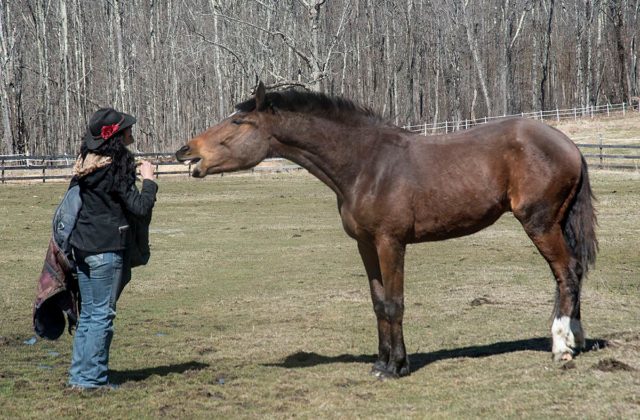Wildlife Rehabilitator Angela Luna Grano Finds a New Home in Norfolk
By Ruth Melville
Wanting to escape what she calls “a suburban prison,” Angela Luna Grano decided to buy a farm and move to Norfolk, drawn here by the town’s natural beauty. Grano, who is a federally licensed wildlife rehabilitator, says that she “felt a certain spirituality in these woods.” She wanted her two daughters to grow up playing outside, and she also needed open land to be able to release her rehabilitated birds.
Now, two years later, she is busily transforming the old Loon Meadow Farm, renamed Grace Land, into a sanctuary for nature and wildlife. Dressed in a cowboy hat, cowboy boots and a long skirt, she keeps in constant motion while we talk, mucking out her barn with two of her five rescue dogs dancing around her feet.
Grano loves working with all animals, but her specialty is rehabilitating birds. “A crow changed my life,” she says with a smile. Over 20 years ago, she was working as a volunteer at Amy’s Udder Joy, a farm park and nature center in Cromwell, Conn., when she was asked to work with Buzzy, a crow who had been trained to peck at coins in order to eventually detonate landmines (not a good career choice for the bird). She was amazed at Buzzy’s intelligence. “These birds are beyond our ability to fully understand. Crows and ravens, I admire their sociability, personality and intelligence.”

Angela Luna Grano takes a break to play with three of her rescue dogs.
Grano would like to continue the tradition of raising horses at Grace Land farm. She has three rescue horses herself, with room to board one more. She has a long-term vision of starting an equine therapy camp. As a first step, she has applied for a grant to bring six women from South Africa to the farm to teach them yoga, body/mind awareness, farming and horse training.
Grano is also passionate about farms. “Farms are Connecticut’s most valuable assets,” she says, “and the country’s greatest cultural heritage.” She admires the slow food movement and has planted pears and apples to make cider. She is expecting to set up her first beehives later this month.
All of her efforts, she says, are “connected by the theme of spiritual recovery. Even growing fruit has that intention.” She fears what she sees as our culture’s push toward escapism, and coming to live on a farm is her way of “getting real.” “I want to celebrate life,” she asserts, and her energy, excitement and enthusiasm for life in all its forms are unmistakable.
To further Grace Land’s mission of reconnecting people with nature through wildlife rescue and conservation, Grano is looking to do more community outreach. Last month she gave a presentation on wildlife rehabilitation at the Norfolk Library’s monthly Corner Club for kids.
She also has loads of simple suggestions for how we can all protect wildlife in small ways, and she intersperses them throughout our conversation. For example, she counsels against removing dead trees, which create a habitat for many varieties of birds and animals. And don’t trim low branches, which enable juvenile owls to climb up out of the reach of predators. “Everything you do,” she says, “has an impact on wildlife.”
On May 12, the day before Mothers’ Day, she will be hosting a fundraising event, “Re-Wild,” at Countryside Park, 336 Huckleberry Hills, Avon, from 2 to 5 p.m., with a talk at 3. She will be sharing stories of her work and her farm and selling canvas prints of her nature photographs.
More suggestions for helping wildlife
- Do not put out poison for mice or rats. Hawks and owls eat the mice and are poisoned in turn.
- Put decals on your windows so that birds don’t fly into them.
- Don’t be afraid to put baby birds back in the nest. Birds have no sense of smell and will not reject a bird just because you’ve touched it.
- Don’t use lawn fertilizer. Robins eat the worms that have picked up chemicals.
- Slow down on country roads at night, so you don’t hit deer or owls.
- Fishermen should not leave hooks in fish, which can kill eagles who eat the fish.
- Bell cats or keep them inside. Cats are predators and can decimate local wildlife.
- Feed hummingbirds a simple homemade sugar solution, not a commercial one with red dye.
Photos by Bruce Frisch.

